Essay: Assessing the World Trade Organisation's Relevance
VerifiedAdded on 2023/01/12
|11
|3866
|66
Essay
AI Summary
This essay provides a comprehensive overview of the World Trade Organisation (WTO), examining its historical origins, purpose, and operational principles. It begins by tracing the WTO's evolution from the General Agreement on Tariffs and Trade (GATT) and outlines its core functions, including regulating global trade, facilitating trade agreements, and resolving disputes. The essay details the key principles governing the WTO's trading system, such as non-discrimination, reciprocity, and transparency. It also addresses the critiques leveled against the WTO, exploring its limitations and areas of concern. Overall, the essay assesses the WTO's relevance and effectiveness in the contemporary global economic landscape, offering a balanced perspective on its role in international trade and economic development.
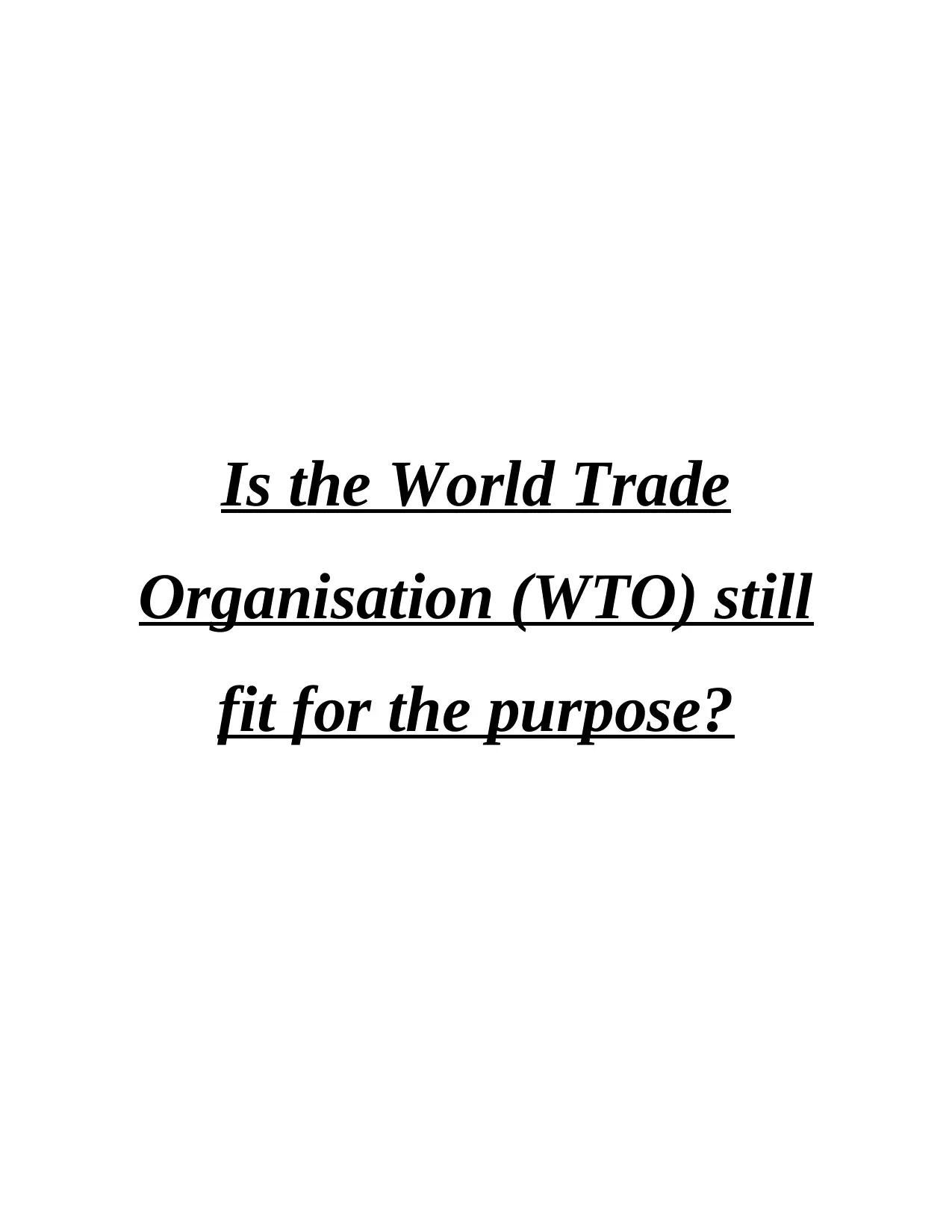
Is the World Trade
Organisation (WTO) still
fit for the purpose?
Organisation (WTO) still
fit for the purpose?
Paraphrase This Document
Need a fresh take? Get an instant paraphrase of this document with our AI Paraphraser
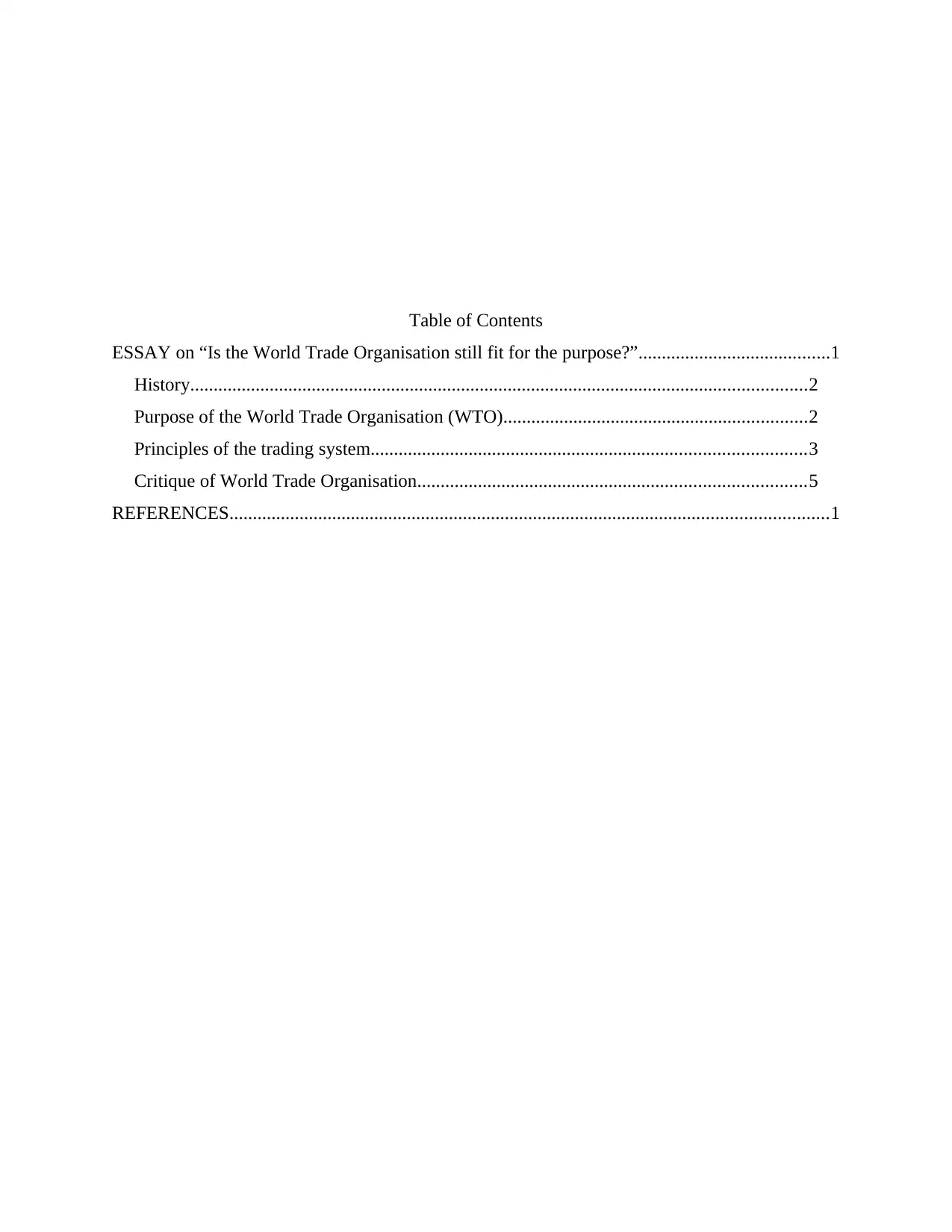
Table of Contents
ESSAY on “Is the World Trade Organisation still fit for the purpose?”.........................................1
History....................................................................................................................................2
Purpose of the World Trade Organisation (WTO).................................................................2
Principles of the trading system.............................................................................................3
Critique of World Trade Organisation...................................................................................5
REFERENCES................................................................................................................................1
ESSAY on “Is the World Trade Organisation still fit for the purpose?”.........................................1
History....................................................................................................................................2
Purpose of the World Trade Organisation (WTO).................................................................2
Principles of the trading system.............................................................................................3
Critique of World Trade Organisation...................................................................................5
REFERENCES................................................................................................................................1
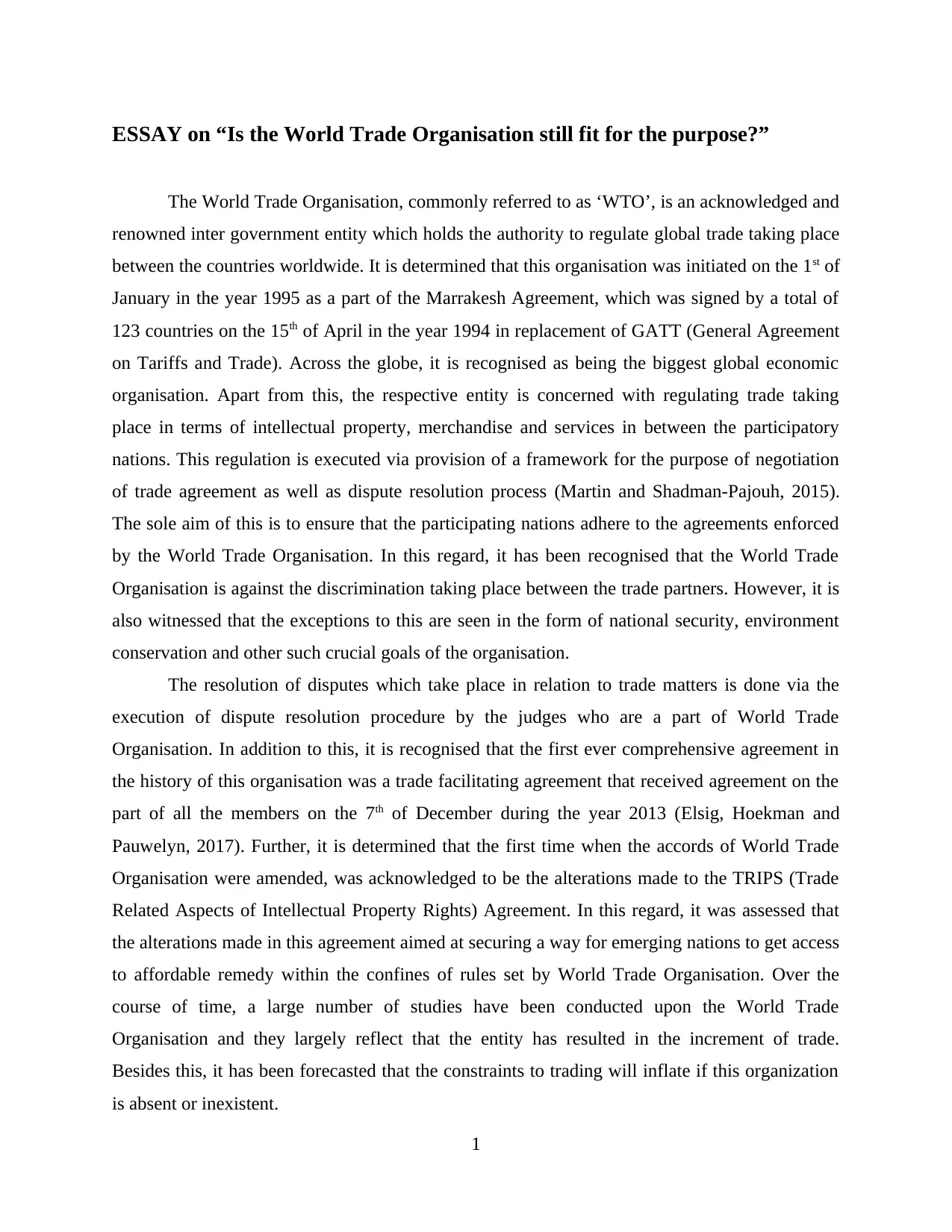
ESSAY on “Is the World Trade Organisation still fit for the purpose?”
The World Trade Organisation, commonly referred to as ‘WTO’, is an acknowledged and
renowned inter government entity which holds the authority to regulate global trade taking place
between the countries worldwide. It is determined that this organisation was initiated on the 1st of
January in the year 1995 as a part of the Marrakesh Agreement, which was signed by a total of
123 countries on the 15th of April in the year 1994 in replacement of GATT (General Agreement
on Tariffs and Trade). Across the globe, it is recognised as being the biggest global economic
organisation. Apart from this, the respective entity is concerned with regulating trade taking
place in terms of intellectual property, merchandise and services in between the participatory
nations. This regulation is executed via provision of a framework for the purpose of negotiation
of trade agreement as well as dispute resolution process (Martin and Shadman-Pajouh, 2015).
The sole aim of this is to ensure that the participating nations adhere to the agreements enforced
by the World Trade Organisation. In this regard, it has been recognised that the World Trade
Organisation is against the discrimination taking place between the trade partners. However, it is
also witnessed that the exceptions to this are seen in the form of national security, environment
conservation and other such crucial goals of the organisation.
The resolution of disputes which take place in relation to trade matters is done via the
execution of dispute resolution procedure by the judges who are a part of World Trade
Organisation. In addition to this, it is recognised that the first ever comprehensive agreement in
the history of this organisation was a trade facilitating agreement that received agreement on the
part of all the members on the 7th of December during the year 2013 (Elsig, Hoekman and
Pauwelyn, 2017). Further, it is determined that the first time when the accords of World Trade
Organisation were amended, was acknowledged to be the alterations made to the TRIPS (Trade
Related Aspects of Intellectual Property Rights) Agreement. In this regard, it was assessed that
the alterations made in this agreement aimed at securing a way for emerging nations to get access
to affordable remedy within the confines of rules set by World Trade Organisation. Over the
course of time, a large number of studies have been conducted upon the World Trade
Organisation and they largely reflect that the entity has resulted in the increment of trade.
Besides this, it has been forecasted that the constraints to trading will inflate if this organization
is absent or inexistent.
1
The World Trade Organisation, commonly referred to as ‘WTO’, is an acknowledged and
renowned inter government entity which holds the authority to regulate global trade taking place
between the countries worldwide. It is determined that this organisation was initiated on the 1st of
January in the year 1995 as a part of the Marrakesh Agreement, which was signed by a total of
123 countries on the 15th of April in the year 1994 in replacement of GATT (General Agreement
on Tariffs and Trade). Across the globe, it is recognised as being the biggest global economic
organisation. Apart from this, the respective entity is concerned with regulating trade taking
place in terms of intellectual property, merchandise and services in between the participatory
nations. This regulation is executed via provision of a framework for the purpose of negotiation
of trade agreement as well as dispute resolution process (Martin and Shadman-Pajouh, 2015).
The sole aim of this is to ensure that the participating nations adhere to the agreements enforced
by the World Trade Organisation. In this regard, it has been recognised that the World Trade
Organisation is against the discrimination taking place between the trade partners. However, it is
also witnessed that the exceptions to this are seen in the form of national security, environment
conservation and other such crucial goals of the organisation.
The resolution of disputes which take place in relation to trade matters is done via the
execution of dispute resolution procedure by the judges who are a part of World Trade
Organisation. In addition to this, it is recognised that the first ever comprehensive agreement in
the history of this organisation was a trade facilitating agreement that received agreement on the
part of all the members on the 7th of December during the year 2013 (Elsig, Hoekman and
Pauwelyn, 2017). Further, it is determined that the first time when the accords of World Trade
Organisation were amended, was acknowledged to be the alterations made to the TRIPS (Trade
Related Aspects of Intellectual Property Rights) Agreement. In this regard, it was assessed that
the alterations made in this agreement aimed at securing a way for emerging nations to get access
to affordable remedy within the confines of rules set by World Trade Organisation. Over the
course of time, a large number of studies have been conducted upon the World Trade
Organisation and they largely reflect that the entity has resulted in the increment of trade.
Besides this, it has been forecasted that the constraints to trading will inflate if this organization
is absent or inexistent.
1
⊘ This is a preview!⊘
Do you want full access?
Subscribe today to unlock all pages.

Trusted by 1+ million students worldwide
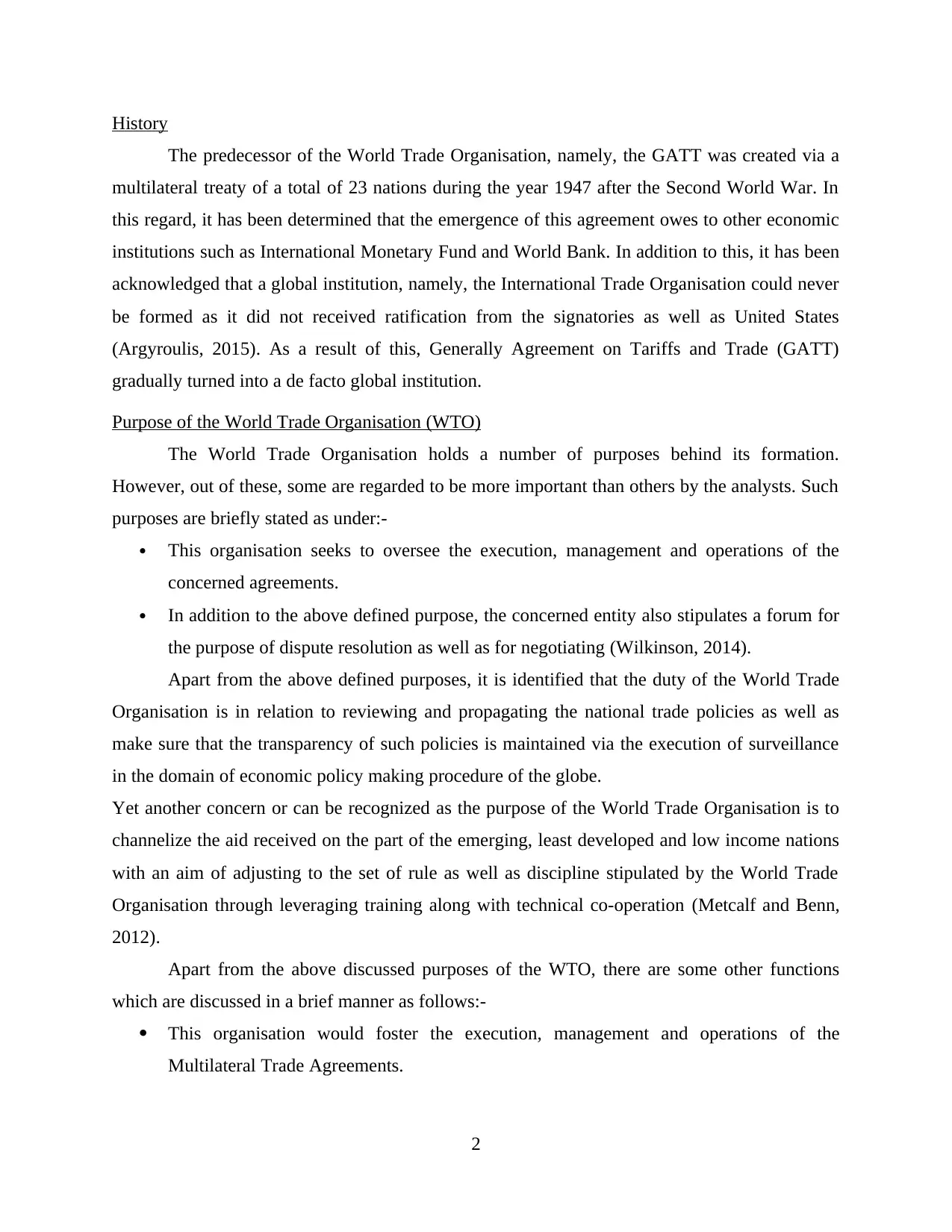
History
The predecessor of the World Trade Organisation, namely, the GATT was created via a
multilateral treaty of a total of 23 nations during the year 1947 after the Second World War. In
this regard, it has been determined that the emergence of this agreement owes to other economic
institutions such as International Monetary Fund and World Bank. In addition to this, it has been
acknowledged that a global institution, namely, the International Trade Organisation could never
be formed as it did not received ratification from the signatories as well as United States
(Argyroulis, 2015). As a result of this, Generally Agreement on Tariffs and Trade (GATT)
gradually turned into a de facto global institution.
Purpose of the World Trade Organisation (WTO)
The World Trade Organisation holds a number of purposes behind its formation.
However, out of these, some are regarded to be more important than others by the analysts. Such
purposes are briefly stated as under:-
This organisation seeks to oversee the execution, management and operations of the
concerned agreements.
In addition to the above defined purpose, the concerned entity also stipulates a forum for
the purpose of dispute resolution as well as for negotiating (Wilkinson, 2014).
Apart from the above defined purposes, it is identified that the duty of the World Trade
Organisation is in relation to reviewing and propagating the national trade policies as well as
make sure that the transparency of such policies is maintained via the execution of surveillance
in the domain of economic policy making procedure of the globe.
Yet another concern or can be recognized as the purpose of the World Trade Organisation is to
channelize the aid received on the part of the emerging, least developed and low income nations
with an aim of adjusting to the set of rule as well as discipline stipulated by the World Trade
Organisation through leveraging training along with technical co-operation (Metcalf and Benn,
2012).
Apart from the above discussed purposes of the WTO, there are some other functions
which are discussed in a brief manner as follows:-
This organisation would foster the execution, management and operations of the
Multilateral Trade Agreements.
2
The predecessor of the World Trade Organisation, namely, the GATT was created via a
multilateral treaty of a total of 23 nations during the year 1947 after the Second World War. In
this regard, it has been determined that the emergence of this agreement owes to other economic
institutions such as International Monetary Fund and World Bank. In addition to this, it has been
acknowledged that a global institution, namely, the International Trade Organisation could never
be formed as it did not received ratification from the signatories as well as United States
(Argyroulis, 2015). As a result of this, Generally Agreement on Tariffs and Trade (GATT)
gradually turned into a de facto global institution.
Purpose of the World Trade Organisation (WTO)
The World Trade Organisation holds a number of purposes behind its formation.
However, out of these, some are regarded to be more important than others by the analysts. Such
purposes are briefly stated as under:-
This organisation seeks to oversee the execution, management and operations of the
concerned agreements.
In addition to the above defined purpose, the concerned entity also stipulates a forum for
the purpose of dispute resolution as well as for negotiating (Wilkinson, 2014).
Apart from the above defined purposes, it is identified that the duty of the World Trade
Organisation is in relation to reviewing and propagating the national trade policies as well as
make sure that the transparency of such policies is maintained via the execution of surveillance
in the domain of economic policy making procedure of the globe.
Yet another concern or can be recognized as the purpose of the World Trade Organisation is to
channelize the aid received on the part of the emerging, least developed and low income nations
with an aim of adjusting to the set of rule as well as discipline stipulated by the World Trade
Organisation through leveraging training along with technical co-operation (Metcalf and Benn,
2012).
Apart from the above discussed purposes of the WTO, there are some other functions
which are discussed in a brief manner as follows:-
This organisation would foster the execution, management and operations of the
Multilateral Trade Agreements.
2
Paraphrase This Document
Need a fresh take? Get an instant paraphrase of this document with our AI Paraphraser
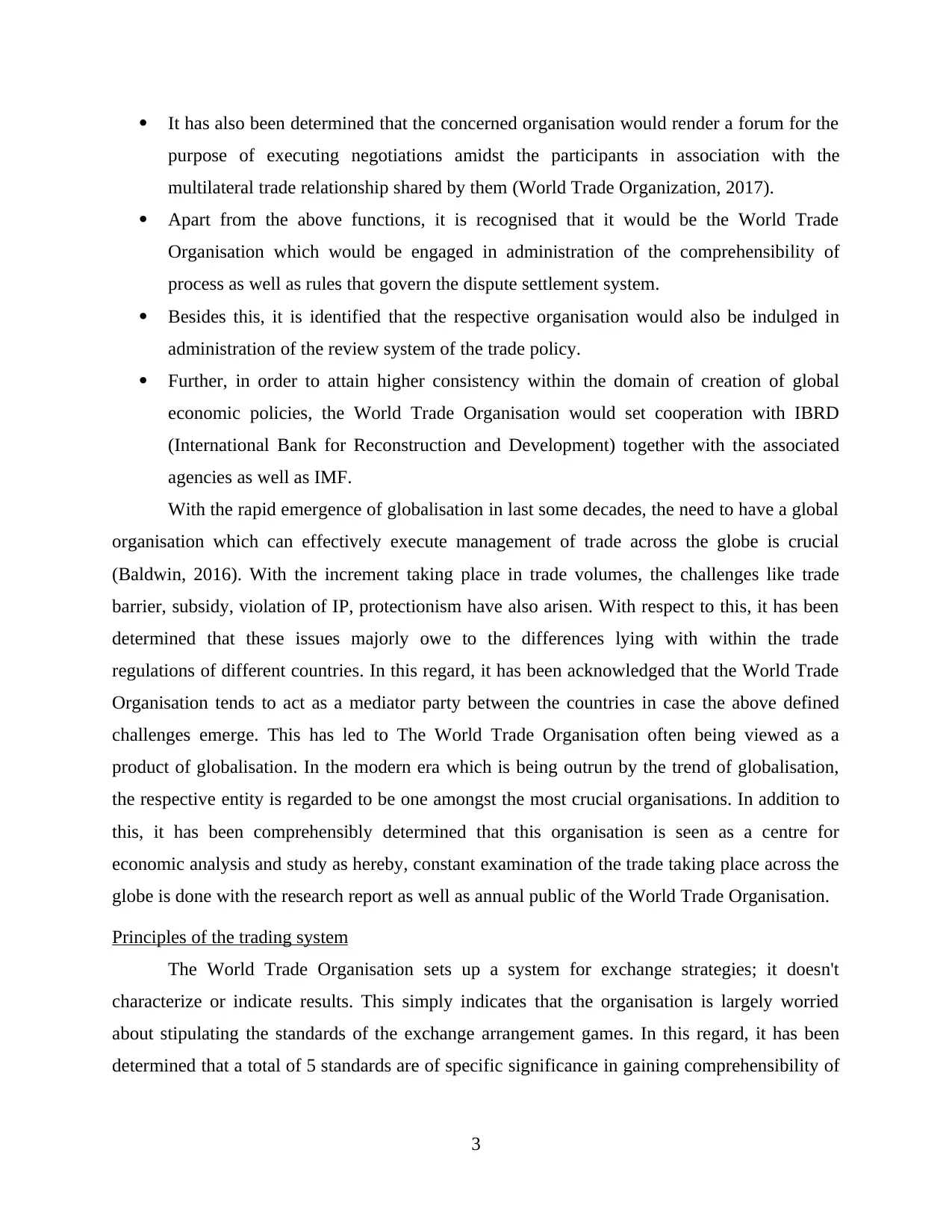
It has also been determined that the concerned organisation would render a forum for the
purpose of executing negotiations amidst the participants in association with the
multilateral trade relationship shared by them (World Trade Organization, 2017).
Apart from the above functions, it is recognised that it would be the World Trade
Organisation which would be engaged in administration of the comprehensibility of
process as well as rules that govern the dispute settlement system.
Besides this, it is identified that the respective organisation would also be indulged in
administration of the review system of the trade policy.
Further, in order to attain higher consistency within the domain of creation of global
economic policies, the World Trade Organisation would set cooperation with IBRD
(International Bank for Reconstruction and Development) together with the associated
agencies as well as IMF.
With the rapid emergence of globalisation in last some decades, the need to have a global
organisation which can effectively execute management of trade across the globe is crucial
(Baldwin, 2016). With the increment taking place in trade volumes, the challenges like trade
barrier, subsidy, violation of IP, protectionism have also arisen. With respect to this, it has been
determined that these issues majorly owe to the differences lying with within the trade
regulations of different countries. In this regard, it has been acknowledged that the World Trade
Organisation tends to act as a mediator party between the countries in case the above defined
challenges emerge. This has led to The World Trade Organisation often being viewed as a
product of globalisation. In the modern era which is being outrun by the trend of globalisation,
the respective entity is regarded to be one amongst the most crucial organisations. In addition to
this, it has been comprehensibly determined that this organisation is seen as a centre for
economic analysis and study as hereby, constant examination of the trade taking place across the
globe is done with the research report as well as annual public of the World Trade Organisation.
Principles of the trading system
The World Trade Organisation sets up a system for exchange strategies; it doesn't
characterize or indicate results. This simply indicates that the organisation is largely worried
about stipulating the standards of the exchange arrangement games. In this regard, it has been
determined that a total of 5 standards are of specific significance in gaining comprehensibility of
3
purpose of executing negotiations amidst the participants in association with the
multilateral trade relationship shared by them (World Trade Organization, 2017).
Apart from the above functions, it is recognised that it would be the World Trade
Organisation which would be engaged in administration of the comprehensibility of
process as well as rules that govern the dispute settlement system.
Besides this, it is identified that the respective organisation would also be indulged in
administration of the review system of the trade policy.
Further, in order to attain higher consistency within the domain of creation of global
economic policies, the World Trade Organisation would set cooperation with IBRD
(International Bank for Reconstruction and Development) together with the associated
agencies as well as IMF.
With the rapid emergence of globalisation in last some decades, the need to have a global
organisation which can effectively execute management of trade across the globe is crucial
(Baldwin, 2016). With the increment taking place in trade volumes, the challenges like trade
barrier, subsidy, violation of IP, protectionism have also arisen. With respect to this, it has been
determined that these issues majorly owe to the differences lying with within the trade
regulations of different countries. In this regard, it has been acknowledged that the World Trade
Organisation tends to act as a mediator party between the countries in case the above defined
challenges emerge. This has led to The World Trade Organisation often being viewed as a
product of globalisation. In the modern era which is being outrun by the trend of globalisation,
the respective entity is regarded to be one amongst the most crucial organisations. In addition to
this, it has been comprehensibly determined that this organisation is seen as a centre for
economic analysis and study as hereby, constant examination of the trade taking place across the
globe is done with the research report as well as annual public of the World Trade Organisation.
Principles of the trading system
The World Trade Organisation sets up a system for exchange strategies; it doesn't
characterize or indicate results. This simply indicates that the organisation is largely worried
about stipulating the standards of the exchange arrangement games. In this regard, it has been
determined that a total of 5 standards are of specific significance in gaining comprehensibility of
3
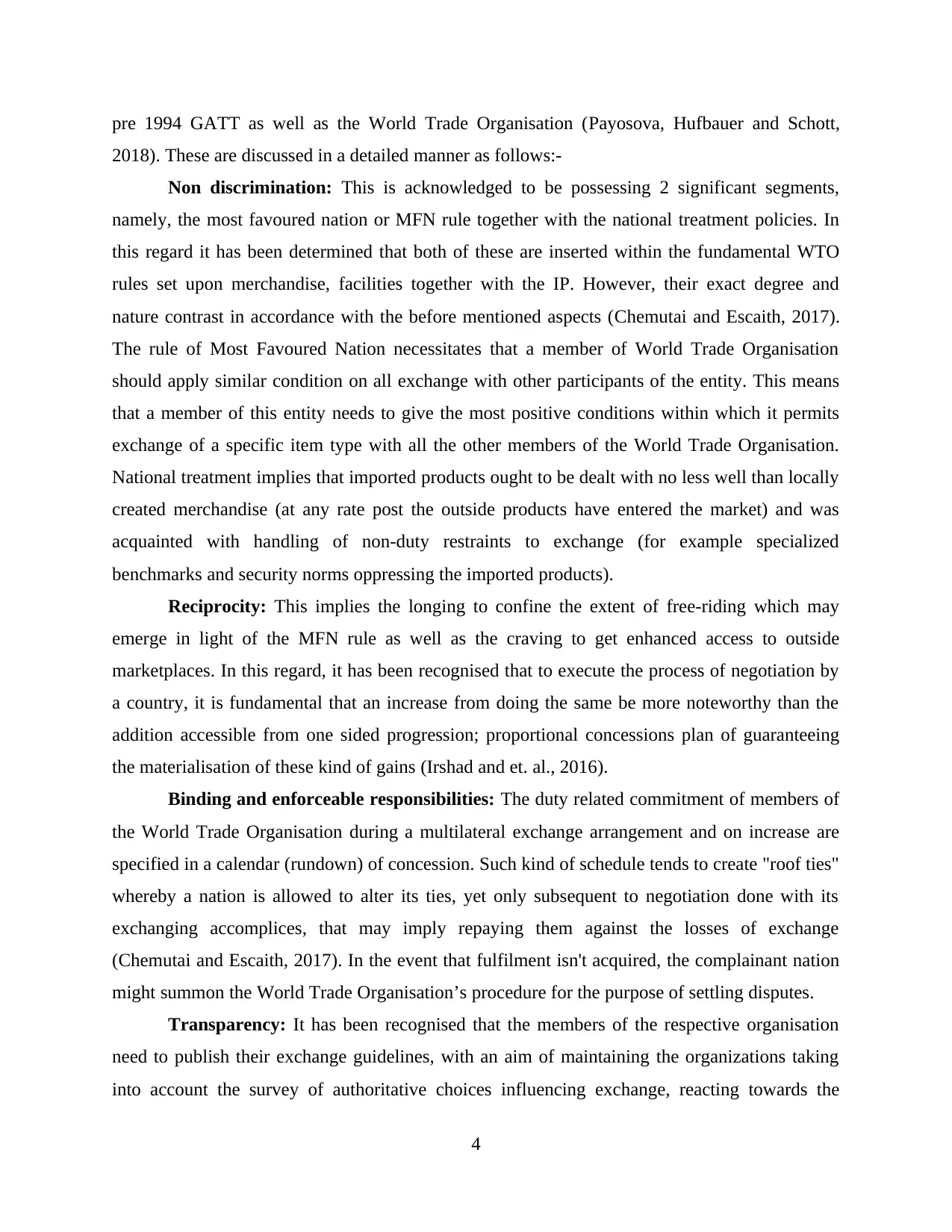
pre 1994 GATT as well as the World Trade Organisation (Payosova, Hufbauer and Schott,
2018). These are discussed in a detailed manner as follows:-
Non discrimination: This is acknowledged to be possessing 2 significant segments,
namely, the most favoured nation or MFN rule together with the national treatment policies. In
this regard it has been determined that both of these are inserted within the fundamental WTO
rules set upon merchandise, facilities together with the IP. However, their exact degree and
nature contrast in accordance with the before mentioned aspects (Chemutai and Escaith, 2017).
The rule of Most Favoured Nation necessitates that a member of World Trade Organisation
should apply similar condition on all exchange with other participants of the entity. This means
that a member of this entity needs to give the most positive conditions within which it permits
exchange of a specific item type with all the other members of the World Trade Organisation.
National treatment implies that imported products ought to be dealt with no less well than locally
created merchandise (at any rate post the outside products have entered the market) and was
acquainted with handling of non-duty restraints to exchange (for example specialized
benchmarks and security norms oppressing the imported products).
Reciprocity: This implies the longing to confine the extent of free-riding which may
emerge in light of the MFN rule as well as the craving to get enhanced access to outside
marketplaces. In this regard, it has been recognised that to execute the process of negotiation by
a country, it is fundamental that an increase from doing the same be more noteworthy than the
addition accessible from one sided progression; proportional concessions plan of guaranteeing
the materialisation of these kind of gains (Irshad and et. al., 2016).
Binding and enforceable responsibilities: The duty related commitment of members of
the World Trade Organisation during a multilateral exchange arrangement and on increase are
specified in a calendar (rundown) of concession. Such kind of schedule tends to create "roof ties"
whereby a nation is allowed to alter its ties, yet only subsequent to negotiation done with its
exchanging accomplices, that may imply repaying them against the losses of exchange
(Chemutai and Escaith, 2017). In the event that fulfilment isn't acquired, the complainant nation
might summon the World Trade Organisation’s procedure for the purpose of settling disputes.
Transparency: It has been recognised that the members of the respective organisation
need to publish their exchange guidelines, with an aim of maintaining the organizations taking
into account the survey of authoritative choices influencing exchange, reacting towards the
4
2018). These are discussed in a detailed manner as follows:-
Non discrimination: This is acknowledged to be possessing 2 significant segments,
namely, the most favoured nation or MFN rule together with the national treatment policies. In
this regard it has been determined that both of these are inserted within the fundamental WTO
rules set upon merchandise, facilities together with the IP. However, their exact degree and
nature contrast in accordance with the before mentioned aspects (Chemutai and Escaith, 2017).
The rule of Most Favoured Nation necessitates that a member of World Trade Organisation
should apply similar condition on all exchange with other participants of the entity. This means
that a member of this entity needs to give the most positive conditions within which it permits
exchange of a specific item type with all the other members of the World Trade Organisation.
National treatment implies that imported products ought to be dealt with no less well than locally
created merchandise (at any rate post the outside products have entered the market) and was
acquainted with handling of non-duty restraints to exchange (for example specialized
benchmarks and security norms oppressing the imported products).
Reciprocity: This implies the longing to confine the extent of free-riding which may
emerge in light of the MFN rule as well as the craving to get enhanced access to outside
marketplaces. In this regard, it has been recognised that to execute the process of negotiation by
a country, it is fundamental that an increase from doing the same be more noteworthy than the
addition accessible from one sided progression; proportional concessions plan of guaranteeing
the materialisation of these kind of gains (Irshad and et. al., 2016).
Binding and enforceable responsibilities: The duty related commitment of members of
the World Trade Organisation during a multilateral exchange arrangement and on increase are
specified in a calendar (rundown) of concession. Such kind of schedule tends to create "roof ties"
whereby a nation is allowed to alter its ties, yet only subsequent to negotiation done with its
exchanging accomplices, that may imply repaying them against the losses of exchange
(Chemutai and Escaith, 2017). In the event that fulfilment isn't acquired, the complainant nation
might summon the World Trade Organisation’s procedure for the purpose of settling disputes.
Transparency: It has been recognised that the members of the respective organisation
need to publish their exchange guidelines, with an aim of maintaining the organizations taking
into account the survey of authoritative choices influencing exchange, reacting towards the
4
⊘ This is a preview!⊘
Do you want full access?
Subscribe today to unlock all pages.

Trusted by 1+ million students worldwide
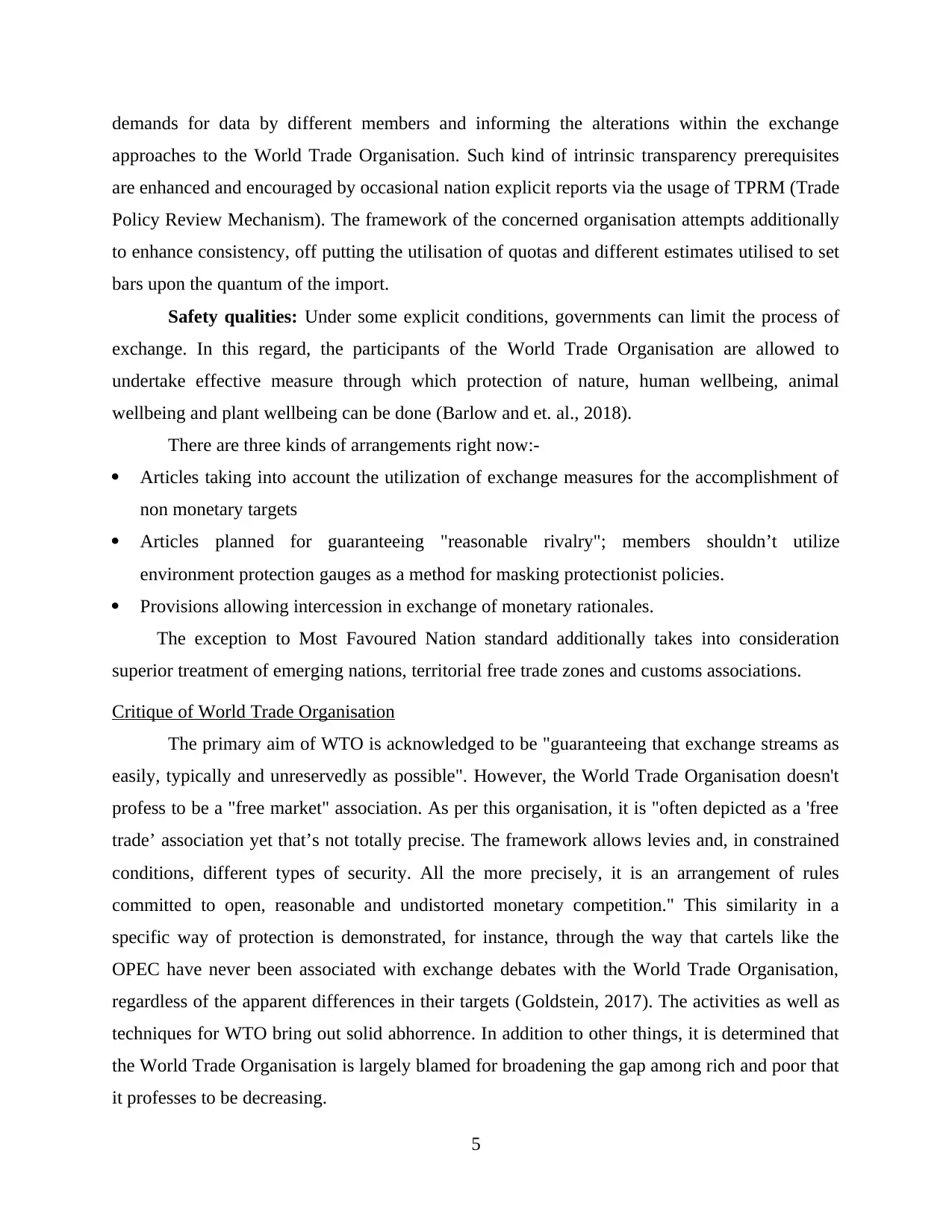
demands for data by different members and informing the alterations within the exchange
approaches to the World Trade Organisation. Such kind of intrinsic transparency prerequisites
are enhanced and encouraged by occasional nation explicit reports via the usage of TPRM (Trade
Policy Review Mechanism). The framework of the concerned organisation attempts additionally
to enhance consistency, off putting the utilisation of quotas and different estimates utilised to set
bars upon the quantum of the import.
Safety qualities: Under some explicit conditions, governments can limit the process of
exchange. In this regard, the participants of the World Trade Organisation are allowed to
undertake effective measure through which protection of nature, human wellbeing, animal
wellbeing and plant wellbeing can be done (Barlow and et. al., 2018).
There are three kinds of arrangements right now:-
Articles taking into account the utilization of exchange measures for the accomplishment of
non monetary targets
Articles planned for guaranteeing "reasonable rivalry"; members shouldn’t utilize
environment protection gauges as a method for masking protectionist policies.
Provisions allowing intercession in exchange of monetary rationales.
The exception to Most Favoured Nation standard additionally takes into consideration
superior treatment of emerging nations, territorial free trade zones and customs associations.
Critique of World Trade Organisation
The primary aim of WTO is acknowledged to be "guaranteeing that exchange streams as
easily, typically and unreservedly as possible". However, the World Trade Organisation doesn't
profess to be a "free market" association. As per this organisation, it is "often depicted as a 'free
trade’ association yet that’s not totally precise. The framework allows levies and, in constrained
conditions, different types of security. All the more precisely, it is an arrangement of rules
committed to open, reasonable and undistorted monetary competition." This similarity in a
specific way of protection is demonstrated, for instance, through the way that cartels like the
OPEC have never been associated with exchange debates with the World Trade Organisation,
regardless of the apparent differences in their targets (Goldstein, 2017). The activities as well as
techniques for WTO bring out solid abhorrence. In addition to other things, it is determined that
the World Trade Organisation is largely blamed for broadening the gap among rich and poor that
it professes to be decreasing.
5
approaches to the World Trade Organisation. Such kind of intrinsic transparency prerequisites
are enhanced and encouraged by occasional nation explicit reports via the usage of TPRM (Trade
Policy Review Mechanism). The framework of the concerned organisation attempts additionally
to enhance consistency, off putting the utilisation of quotas and different estimates utilised to set
bars upon the quantum of the import.
Safety qualities: Under some explicit conditions, governments can limit the process of
exchange. In this regard, the participants of the World Trade Organisation are allowed to
undertake effective measure through which protection of nature, human wellbeing, animal
wellbeing and plant wellbeing can be done (Barlow and et. al., 2018).
There are three kinds of arrangements right now:-
Articles taking into account the utilization of exchange measures for the accomplishment of
non monetary targets
Articles planned for guaranteeing "reasonable rivalry"; members shouldn’t utilize
environment protection gauges as a method for masking protectionist policies.
Provisions allowing intercession in exchange of monetary rationales.
The exception to Most Favoured Nation standard additionally takes into consideration
superior treatment of emerging nations, territorial free trade zones and customs associations.
Critique of World Trade Organisation
The primary aim of WTO is acknowledged to be "guaranteeing that exchange streams as
easily, typically and unreservedly as possible". However, the World Trade Organisation doesn't
profess to be a "free market" association. As per this organisation, it is "often depicted as a 'free
trade’ association yet that’s not totally precise. The framework allows levies and, in constrained
conditions, different types of security. All the more precisely, it is an arrangement of rules
committed to open, reasonable and undistorted monetary competition." This similarity in a
specific way of protection is demonstrated, for instance, through the way that cartels like the
OPEC have never been associated with exchange debates with the World Trade Organisation,
regardless of the apparent differences in their targets (Goldstein, 2017). The activities as well as
techniques for WTO bring out solid abhorrence. In addition to other things, it is determined that
the World Trade Organisation is largely blamed for broadening the gap among rich and poor that
it professes to be decreasing.
5
Paraphrase This Document
Need a fresh take? Get an instant paraphrase of this document with our AI Paraphraser
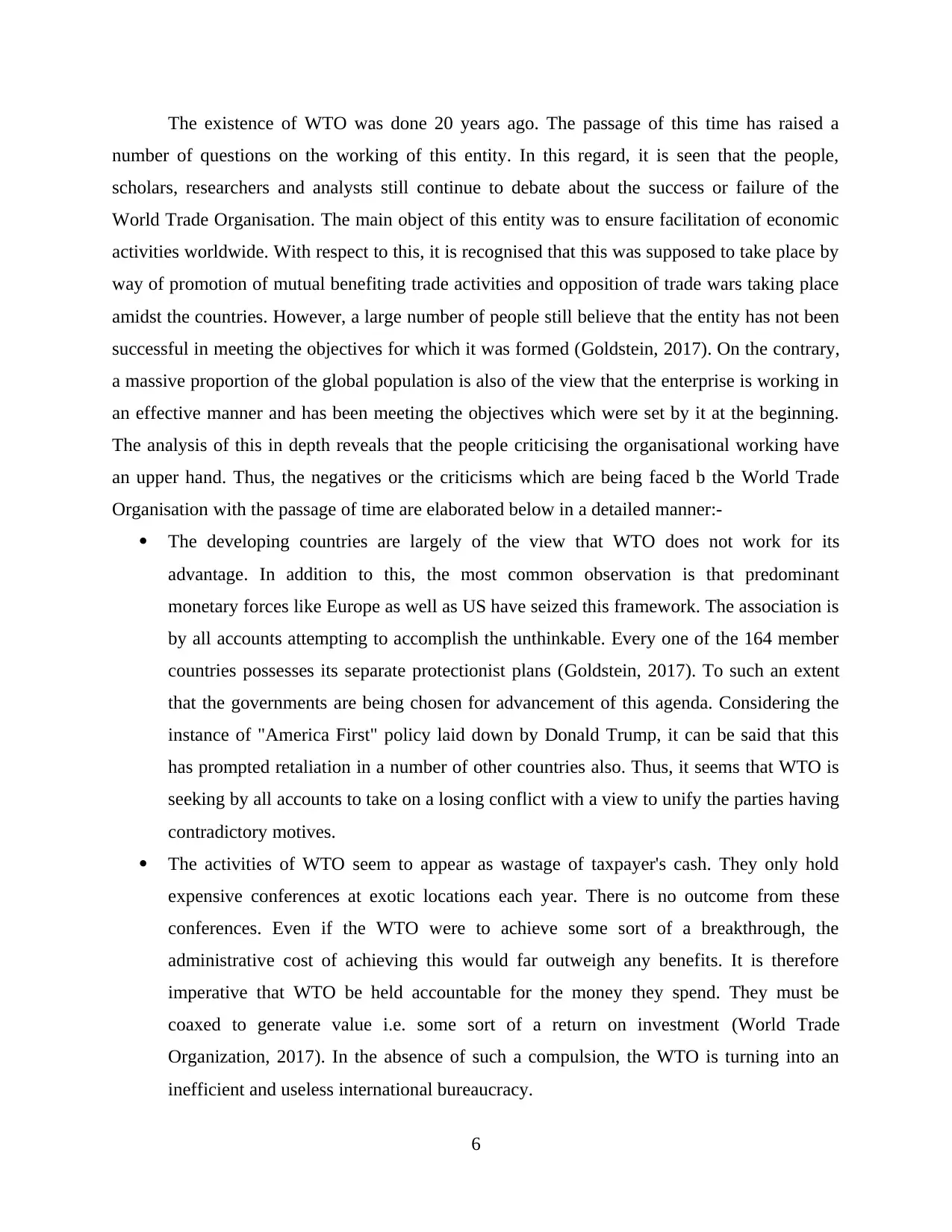
The existence of WTO was done 20 years ago. The passage of this time has raised a
number of questions on the working of this entity. In this regard, it is seen that the people,
scholars, researchers and analysts still continue to debate about the success or failure of the
World Trade Organisation. The main object of this entity was to ensure facilitation of economic
activities worldwide. With respect to this, it is recognised that this was supposed to take place by
way of promotion of mutual benefiting trade activities and opposition of trade wars taking place
amidst the countries. However, a large number of people still believe that the entity has not been
successful in meeting the objectives for which it was formed (Goldstein, 2017). On the contrary,
a massive proportion of the global population is also of the view that the enterprise is working in
an effective manner and has been meeting the objectives which were set by it at the beginning.
The analysis of this in depth reveals that the people criticising the organisational working have
an upper hand. Thus, the negatives or the criticisms which are being faced b the World Trade
Organisation with the passage of time are elaborated below in a detailed manner:-
The developing countries are largely of the view that WTO does not work for its
advantage. In addition to this, the most common observation is that predominant
monetary forces like Europe as well as US have seized this framework. The association is
by all accounts attempting to accomplish the unthinkable. Every one of the 164 member
countries possesses its separate protectionist plans (Goldstein, 2017). To such an extent
that the governments are being chosen for advancement of this agenda. Considering the
instance of "America First" policy laid down by Donald Trump, it can be said that this
has prompted retaliation in a number of other countries also. Thus, it seems that WTO is
seeking by all accounts to take on a losing conflict with a view to unify the parties having
contradictory motives.
The activities of WTO seem to appear as wastage of taxpayer's cash. They only hold
expensive conferences at exotic locations each year. There is no outcome from these
conferences. Even if the WTO were to achieve some sort of a breakthrough, the
administrative cost of achieving this would far outweigh any benefits. It is therefore
imperative that WTO be held accountable for the money they spend. They must be
coaxed to generate value i.e. some sort of a return on investment (World Trade
Organization, 2017). In the absence of such a compulsion, the WTO is turning into an
inefficient and useless international bureaucracy.
6
number of questions on the working of this entity. In this regard, it is seen that the people,
scholars, researchers and analysts still continue to debate about the success or failure of the
World Trade Organisation. The main object of this entity was to ensure facilitation of economic
activities worldwide. With respect to this, it is recognised that this was supposed to take place by
way of promotion of mutual benefiting trade activities and opposition of trade wars taking place
amidst the countries. However, a large number of people still believe that the entity has not been
successful in meeting the objectives for which it was formed (Goldstein, 2017). On the contrary,
a massive proportion of the global population is also of the view that the enterprise is working in
an effective manner and has been meeting the objectives which were set by it at the beginning.
The analysis of this in depth reveals that the people criticising the organisational working have
an upper hand. Thus, the negatives or the criticisms which are being faced b the World Trade
Organisation with the passage of time are elaborated below in a detailed manner:-
The developing countries are largely of the view that WTO does not work for its
advantage. In addition to this, the most common observation is that predominant
monetary forces like Europe as well as US have seized this framework. The association is
by all accounts attempting to accomplish the unthinkable. Every one of the 164 member
countries possesses its separate protectionist plans (Goldstein, 2017). To such an extent
that the governments are being chosen for advancement of this agenda. Considering the
instance of "America First" policy laid down by Donald Trump, it can be said that this
has prompted retaliation in a number of other countries also. Thus, it seems that WTO is
seeking by all accounts to take on a losing conflict with a view to unify the parties having
contradictory motives.
The activities of WTO seem to appear as wastage of taxpayer's cash. They only hold
expensive conferences at exotic locations each year. There is no outcome from these
conferences. Even if the WTO were to achieve some sort of a breakthrough, the
administrative cost of achieving this would far outweigh any benefits. It is therefore
imperative that WTO be held accountable for the money they spend. They must be
coaxed to generate value i.e. some sort of a return on investment (World Trade
Organization, 2017). In the absence of such a compulsion, the WTO is turning into an
inefficient and useless international bureaucracy.
6
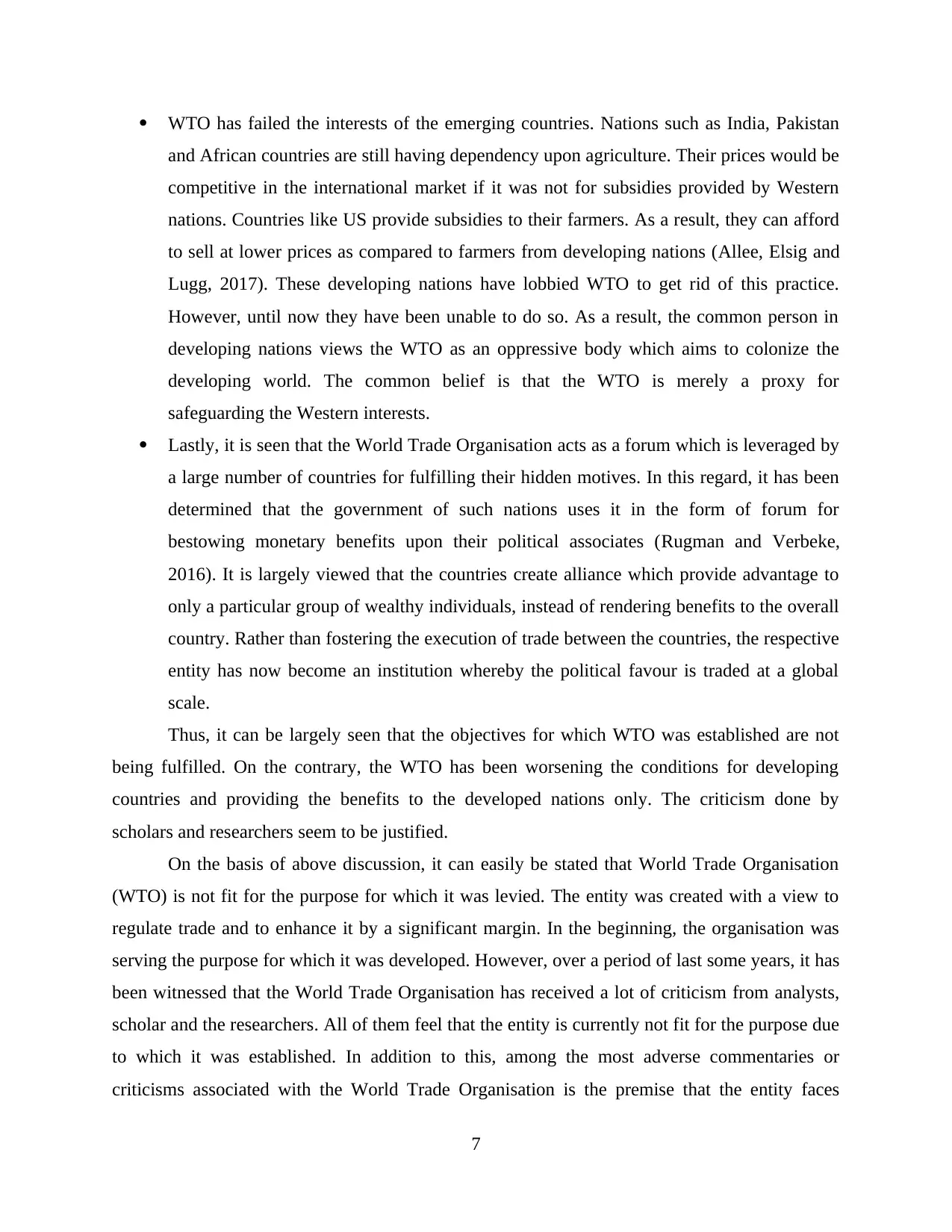
WTO has failed the interests of the emerging countries. Nations such as India, Pakistan
and African countries are still having dependency upon agriculture. Their prices would be
competitive in the international market if it was not for subsidies provided by Western
nations. Countries like US provide subsidies to their farmers. As a result, they can afford
to sell at lower prices as compared to farmers from developing nations (Allee, Elsig and
Lugg, 2017). These developing nations have lobbied WTO to get rid of this practice.
However, until now they have been unable to do so. As a result, the common person in
developing nations views the WTO as an oppressive body which aims to colonize the
developing world. The common belief is that the WTO is merely a proxy for
safeguarding the Western interests.
Lastly, it is seen that the World Trade Organisation acts as a forum which is leveraged by
a large number of countries for fulfilling their hidden motives. In this regard, it has been
determined that the government of such nations uses it in the form of forum for
bestowing monetary benefits upon their political associates (Rugman and Verbeke,
2016). It is largely viewed that the countries create alliance which provide advantage to
only a particular group of wealthy individuals, instead of rendering benefits to the overall
country. Rather than fostering the execution of trade between the countries, the respective
entity has now become an institution whereby the political favour is traded at a global
scale.
Thus, it can be largely seen that the objectives for which WTO was established are not
being fulfilled. On the contrary, the WTO has been worsening the conditions for developing
countries and providing the benefits to the developed nations only. The criticism done by
scholars and researchers seem to be justified.
On the basis of above discussion, it can easily be stated that World Trade Organisation
(WTO) is not fit for the purpose for which it was levied. The entity was created with a view to
regulate trade and to enhance it by a significant margin. In the beginning, the organisation was
serving the purpose for which it was developed. However, over a period of last some years, it has
been witnessed that the World Trade Organisation has received a lot of criticism from analysts,
scholar and the researchers. All of them feel that the entity is currently not fit for the purpose due
to which it was established. In addition to this, among the most adverse commentaries or
criticisms associated with the World Trade Organisation is the premise that the entity faces
7
and African countries are still having dependency upon agriculture. Their prices would be
competitive in the international market if it was not for subsidies provided by Western
nations. Countries like US provide subsidies to their farmers. As a result, they can afford
to sell at lower prices as compared to farmers from developing nations (Allee, Elsig and
Lugg, 2017). These developing nations have lobbied WTO to get rid of this practice.
However, until now they have been unable to do so. As a result, the common person in
developing nations views the WTO as an oppressive body which aims to colonize the
developing world. The common belief is that the WTO is merely a proxy for
safeguarding the Western interests.
Lastly, it is seen that the World Trade Organisation acts as a forum which is leveraged by
a large number of countries for fulfilling their hidden motives. In this regard, it has been
determined that the government of such nations uses it in the form of forum for
bestowing monetary benefits upon their political associates (Rugman and Verbeke,
2016). It is largely viewed that the countries create alliance which provide advantage to
only a particular group of wealthy individuals, instead of rendering benefits to the overall
country. Rather than fostering the execution of trade between the countries, the respective
entity has now become an institution whereby the political favour is traded at a global
scale.
Thus, it can be largely seen that the objectives for which WTO was established are not
being fulfilled. On the contrary, the WTO has been worsening the conditions for developing
countries and providing the benefits to the developed nations only. The criticism done by
scholars and researchers seem to be justified.
On the basis of above discussion, it can easily be stated that World Trade Organisation
(WTO) is not fit for the purpose for which it was levied. The entity was created with a view to
regulate trade and to enhance it by a significant margin. In the beginning, the organisation was
serving the purpose for which it was developed. However, over a period of last some years, it has
been witnessed that the World Trade Organisation has received a lot of criticism from analysts,
scholar and the researchers. All of them feel that the entity is currently not fit for the purpose due
to which it was established. In addition to this, among the most adverse commentaries or
criticisms associated with the World Trade Organisation is the premise that the entity faces
7
⊘ This is a preview!⊘
Do you want full access?
Subscribe today to unlock all pages.

Trusted by 1+ million students worldwide
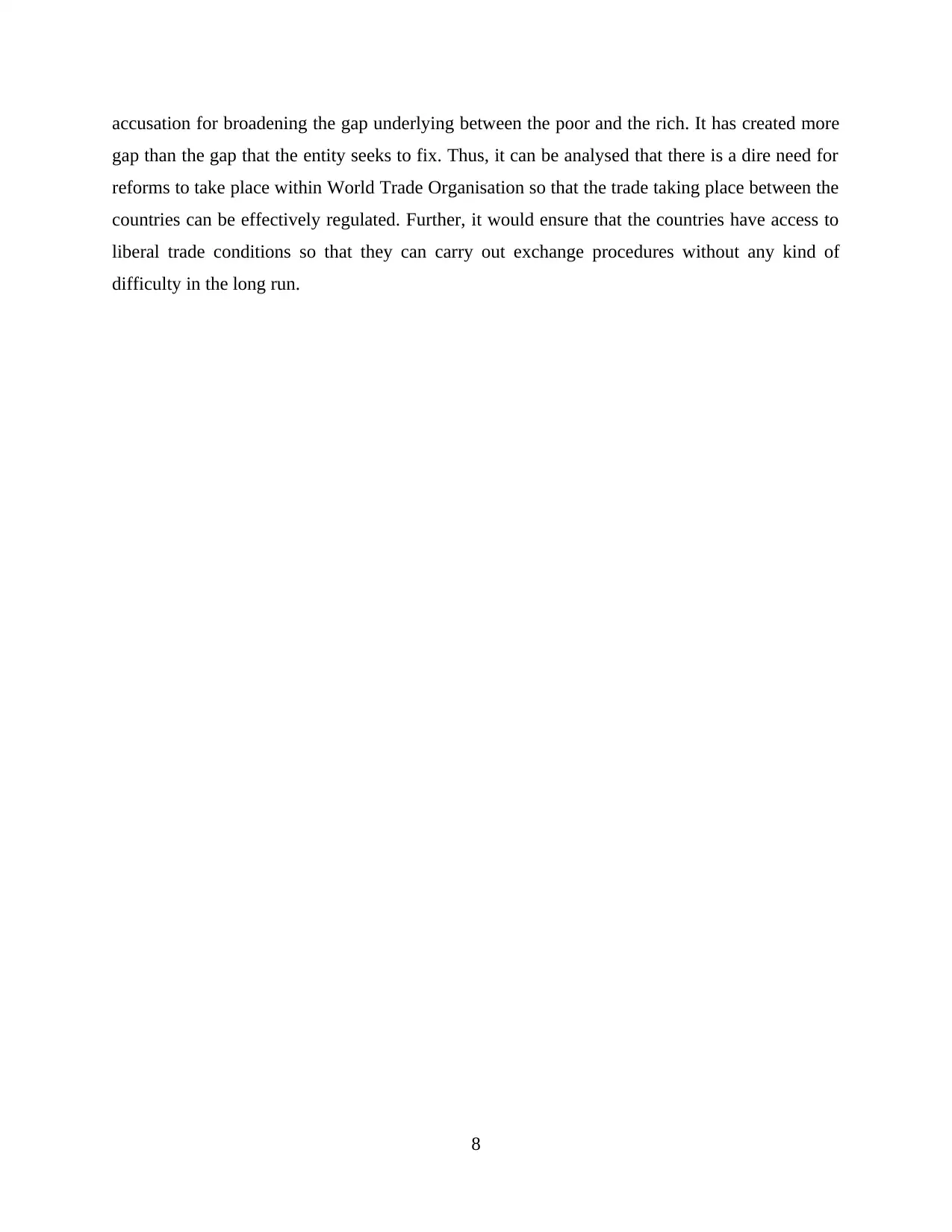
accusation for broadening the gap underlying between the poor and the rich. It has created more
gap than the gap that the entity seeks to fix. Thus, it can be analysed that there is a dire need for
reforms to take place within World Trade Organisation so that the trade taking place between the
countries can be effectively regulated. Further, it would ensure that the countries have access to
liberal trade conditions so that they can carry out exchange procedures without any kind of
difficulty in the long run.
8
gap than the gap that the entity seeks to fix. Thus, it can be analysed that there is a dire need for
reforms to take place within World Trade Organisation so that the trade taking place between the
countries can be effectively regulated. Further, it would ensure that the countries have access to
liberal trade conditions so that they can carry out exchange procedures without any kind of
difficulty in the long run.
8
Paraphrase This Document
Need a fresh take? Get an instant paraphrase of this document with our AI Paraphraser
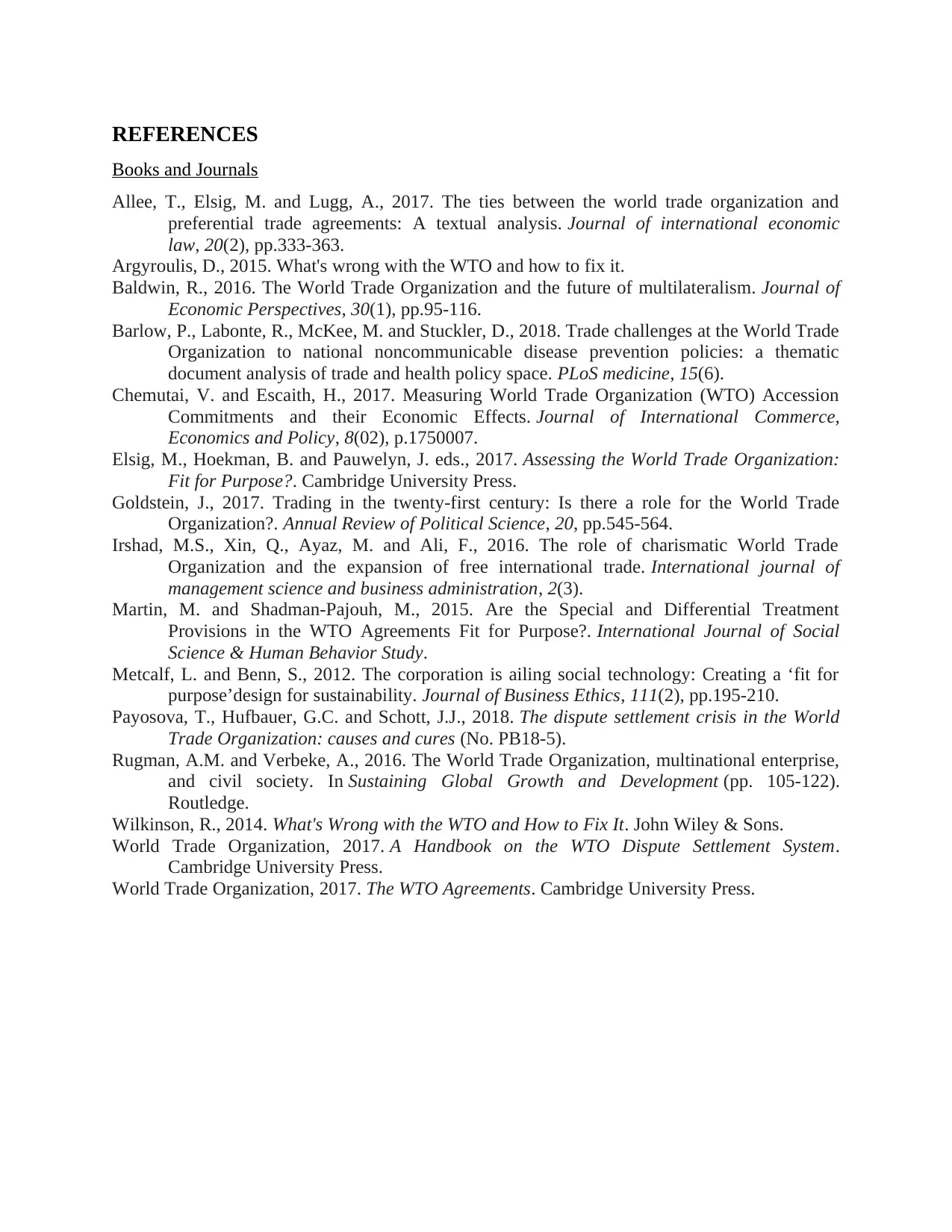
REFERENCES
Books and Journals
Allee, T., Elsig, M. and Lugg, A., 2017. The ties between the world trade organization and
preferential trade agreements: A textual analysis. Journal of international economic
law, 20(2), pp.333-363.
Argyroulis, D., 2015. What's wrong with the WTO and how to fix it.
Baldwin, R., 2016. The World Trade Organization and the future of multilateralism. Journal of
Economic Perspectives, 30(1), pp.95-116.
Barlow, P., Labonte, R., McKee, M. and Stuckler, D., 2018. Trade challenges at the World Trade
Organization to national noncommunicable disease prevention policies: a thematic
document analysis of trade and health policy space. PLoS medicine, 15(6).
Chemutai, V. and Escaith, H., 2017. Measuring World Trade Organization (WTO) Accession
Commitments and their Economic Effects. Journal of International Commerce,
Economics and Policy, 8(02), p.1750007.
Elsig, M., Hoekman, B. and Pauwelyn, J. eds., 2017. Assessing the World Trade Organization:
Fit for Purpose?. Cambridge University Press.
Goldstein, J., 2017. Trading in the twenty-first century: Is there a role for the World Trade
Organization?. Annual Review of Political Science, 20, pp.545-564.
Irshad, M.S., Xin, Q., Ayaz, M. and Ali, F., 2016. The role of charismatic World Trade
Organization and the expansion of free international trade. International journal of
management science and business administration, 2(3).
Martin, M. and Shadman-Pajouh, M., 2015. Are the Special and Differential Treatment
Provisions in the WTO Agreements Fit for Purpose?. International Journal of Social
Science & Human Behavior Study.
Metcalf, L. and Benn, S., 2012. The corporation is ailing social technology: Creating a ‘fit for
purpose’design for sustainability. Journal of Business Ethics, 111(2), pp.195-210.
Payosova, T., Hufbauer, G.C. and Schott, J.J., 2018. The dispute settlement crisis in the World
Trade Organization: causes and cures (No. PB18-5).
Rugman, A.M. and Verbeke, A., 2016. The World Trade Organization, multinational enterprise,
and civil society. In Sustaining Global Growth and Development (pp. 105-122).
Routledge.
Wilkinson, R., 2014. What's Wrong with the WTO and How to Fix It. John Wiley & Sons.
World Trade Organization, 2017. A Handbook on the WTO Dispute Settlement System.
Cambridge University Press.
World Trade Organization, 2017. The WTO Agreements. Cambridge University Press.
Books and Journals
Allee, T., Elsig, M. and Lugg, A., 2017. The ties between the world trade organization and
preferential trade agreements: A textual analysis. Journal of international economic
law, 20(2), pp.333-363.
Argyroulis, D., 2015. What's wrong with the WTO and how to fix it.
Baldwin, R., 2016. The World Trade Organization and the future of multilateralism. Journal of
Economic Perspectives, 30(1), pp.95-116.
Barlow, P., Labonte, R., McKee, M. and Stuckler, D., 2018. Trade challenges at the World Trade
Organization to national noncommunicable disease prevention policies: a thematic
document analysis of trade and health policy space. PLoS medicine, 15(6).
Chemutai, V. and Escaith, H., 2017. Measuring World Trade Organization (WTO) Accession
Commitments and their Economic Effects. Journal of International Commerce,
Economics and Policy, 8(02), p.1750007.
Elsig, M., Hoekman, B. and Pauwelyn, J. eds., 2017. Assessing the World Trade Organization:
Fit for Purpose?. Cambridge University Press.
Goldstein, J., 2017. Trading in the twenty-first century: Is there a role for the World Trade
Organization?. Annual Review of Political Science, 20, pp.545-564.
Irshad, M.S., Xin, Q., Ayaz, M. and Ali, F., 2016. The role of charismatic World Trade
Organization and the expansion of free international trade. International journal of
management science and business administration, 2(3).
Martin, M. and Shadman-Pajouh, M., 2015. Are the Special and Differential Treatment
Provisions in the WTO Agreements Fit for Purpose?. International Journal of Social
Science & Human Behavior Study.
Metcalf, L. and Benn, S., 2012. The corporation is ailing social technology: Creating a ‘fit for
purpose’design for sustainability. Journal of Business Ethics, 111(2), pp.195-210.
Payosova, T., Hufbauer, G.C. and Schott, J.J., 2018. The dispute settlement crisis in the World
Trade Organization: causes and cures (No. PB18-5).
Rugman, A.M. and Verbeke, A., 2016. The World Trade Organization, multinational enterprise,
and civil society. In Sustaining Global Growth and Development (pp. 105-122).
Routledge.
Wilkinson, R., 2014. What's Wrong with the WTO and How to Fix It. John Wiley & Sons.
World Trade Organization, 2017. A Handbook on the WTO Dispute Settlement System.
Cambridge University Press.
World Trade Organization, 2017. The WTO Agreements. Cambridge University Press.
1 out of 11
Related Documents
Your All-in-One AI-Powered Toolkit for Academic Success.
+13062052269
info@desklib.com
Available 24*7 on WhatsApp / Email
![[object Object]](/_next/static/media/star-bottom.7253800d.svg)
Unlock your academic potential
Copyright © 2020–2026 A2Z Services. All Rights Reserved. Developed and managed by ZUCOL.




